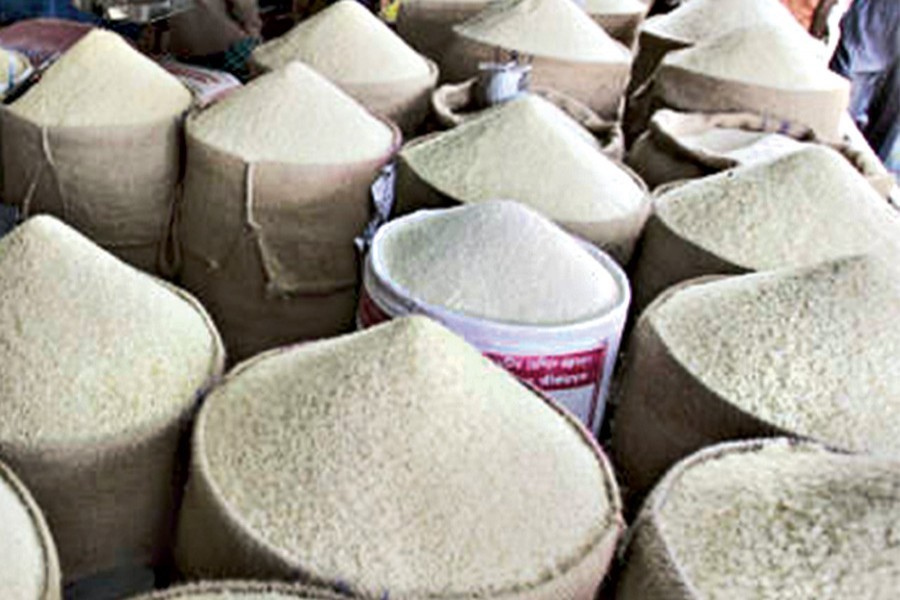A watchdog born to bring healthy competition among businesses lies "ineffective" even after over one and a half years of its existence, leaving fair trade a far cry and price fixing unchecked.
Recent rice-market prance, among other price distortions, is seen by economists as an outcome of keeping the Competition Commission (CC) a lame duck.
The commission was formed in April 2016 under a law passed sometime in 2012 to ensure fair trade practices by creating a level playing field for all entrepreneurs in the country so to avert market manipulation by any oligopoly.
The government established the organisation as there have been allegations that businesses play foul many times or they form cartel or unholy axis on different products or services to derive abnormal profits.
Generally two types of anti-competitive practices are usually happening in Bangladesh: agreeing not to compete with another business and abuse of a dominant position on the market.
By forming cartel businesses can fix price, bid for rigging share markets or customers' commercially sensitive information.
Recently, the rice market was volatile on information about flashfloods in greater Sylhet. The prices of the staple shot up an all-time high, eroding real income of the limited- income-bracket people.
The main function of the CC, as defined by the law, is to screen out anti-competition activities and take punitive action as safeguard to protect consumers.
As part of the activation process of the CC the government appointed its chairman sometime in April in 2016 along with two members. The government also gave attachments of five officials to run the office.
But, observers said, there has been no action on the anti-competition practices so far to prevent a rat race in trade and business.
People at the CC told the FE Thursday that they had been preparing for making it a "full-fledged organisation".
Md Iqbal Khan Chowdhury, chairperson of the Competition Commission, told the FE that they were doing groundwork for the functioning of the watchdog.
The CC chairman, however, blamed bureaucratic tangles for delays over its organogram.
"The government has approved a 73-man permanent staff and this is expected to be approved by the Secretary Committee soon," he said.
But the organogram still looks way off as it requires Prime Minister's approval before execution. And the process of recruiting is also a time-consuming matter.
But there is at least one new organisation named Insurance Development and Regulatory Authority (IDRA) which is exceptional in that it had hired some freshers from the universities and started its activities since its inception in 2011.
The manpower, numbering around 70, is now in the process of being regularized with government services.
But people familiar with the CC predicament told the FE that there is little chance of starting its main tasks, like investigating unfair business practices, in the near future.
Dr Selim Raihan, a professor of Economics at the University of Dhaka, told the FE that the CC, formed as per the Competition Commission Act 2012, remained virtually "ineffective" for lack of its required manpower and other skills.
Dr Raihan, who recently visited it and made a presentation on the role and activities of the Commission, told the FE that their main strength should be their investigation wing. "It seems to me that they are yet to concentrate on it.
"How will they investigate, how will understand the market behaviour if they lack such type of skilled manpower?"
However, the CC chief, Mr Iqbal, told the FE that they had sought people for attachments with backgrounds on economics and business and finances.
"Even I met with the public administration secretary on the issue. Lastly, I got those who never studied such disciplines," the chairperson told the FE, on a note of frustration.
Preparing rules and regulations for effective and smooth implementation of the Act concerned are required. The Competition Commission Act 2012 needs at least two dozen rules and regulations.
Dr Raihan said the CC is yet to issue the rules and regulations needed for implementation of the Act passed at least five years back.
Contrary to it, the CC chairperson said they had submitted some rules and regulations to the Ministry of Commerce.
"I did not get even a single rule. The most important rule is about fund management which is yet to be okayed."
However, another economist who also visited the CC recently noted with dissatisfaction that the organisation couldn't yet start its main function.
Dr Khondaker Golam Moazzem, research director at the country's oldest private think tank -- Centre for Policy Dialogue (CPD) -- said competition policy is about applying rules to make sure businesses and companies compete fairly with one another to give the market a chance to play fair.
"The office is there but no action," he said.
The economist said ensuring fair practices in business is very much important considering its role in improving efficiency in the enterprises, creating a wider choice for consumers and helping reduce prices and improving product and service quality.
"Fair and competitive activities help ensure low prices for all," he commented.
"The simplest way for a company to gain a high market share is to offer a better price through the competitive manner," he said.
The policy analyst said in a competitive market, prices should be pushed down.
"Not only is this good for consumers - when more people can afford to buy products, it encourages businesses to produce and boost the economy in general," he said.
He said if there was an effective CC, then the organisation could investigate the recent volatility on the rice market and identify the real culprits.
The CC has the power to lodge criminal cases against the market players with provision of imprisonment.


